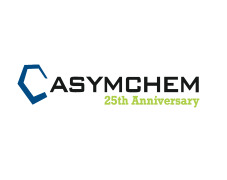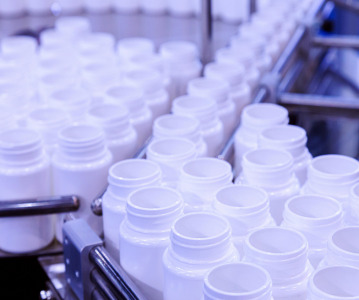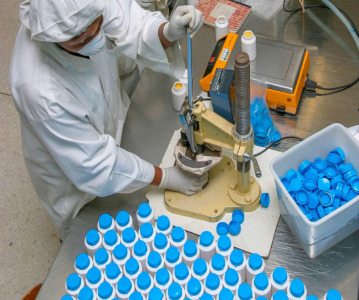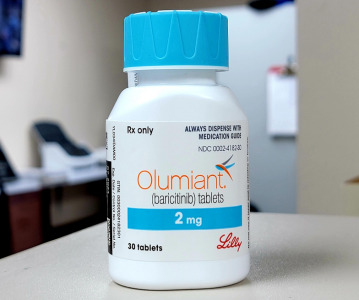CPHI Online Trend Report: How can flow chemistry help businesses achieve their sustainability goals?
.png)
In our latest CPHI Online Trend Report, we partner with Asymchem to understand the innovative potential of flow chemistry for API manufacturing, especially in regards to meeting sustainability goals.
With insight from industry leaders, academia, and more, this free report gives an in-depth examination of the principles behind flow chemistry, the core tenets of Green Chemistry, and how API manufacturing can maximise the potential of flow technologies in their operations.
Active pharmaceutical ingredients (APIs) form the therapeutic base of almost all drug products. Whether they are small molecule synthetic drugs or biologics derived from human, animal, or microorganism biotechnology, the manufacturing of APIs involves a diverse range of complex chemical and/or biological processes. There are a number of aspects to consider regardless of the type of API, as Jon Brice, Senior Vice President of Business Development at Asymchem Group, comments in the report: “Irrespective of the operational motif, the considerations remain the same – control of impurities, a robust process that can be validated, tracking and quantifying impurities, and collecting data on process parameters.”
Key drivers of API research and manufacturing are in the form of oncology drugs, novel formulations in targeted therapies, and the rise in obesity drugs. One of the most pressing issues for API manufacturers, however, remains balancing sustainability concerns with the safety, quality, and economic viability of their drug products. At each stage of API manufacturing, various solvents, chemicals, and waste products are used and/or produced resulting in a process that is energy and material-intensive. While sustainable operations tend to focus on improving waste reduction, energy efficiency, and greener solvents, there remain untapped opportunities in optimising reaction conditions, reducing the environmental impact of raw materials, and enhancing the overall efficiency of chemical processes, as Senior Scientist at Fraunhofer IMM Gabriele Menges-Flanagan states.
Flow chemistry technologies may be the next transformational technology manufacturers can take advantage of. Such enhancements to operations include improved control over heat and mass transfer, generation and consumption of reactive intermediates in a safer manner, less impurities generated, and improved overall yields. Flow chemistry is also very versatile and flexible with room to be optimised for the reaction taking place. However, some challenges remain for the full adoption of flow technologies in pharmaceutical manufacturing – namely, worker expertise and know-how, as well as regulatory issues around manufacturing practices for flow.
Despite these continuing challenges, experts agree that flow chemistry can offer a number of benefits for API manufacturing, especially in regards to achieving sustainability goals. “You can expand the scope of such a technology, but the real advantage with flow is using it where appropriate and optimising it to a specific problem,” Brice concludes.
To find out more about how flow chemistry can support sustainable API manufacturing, download our FREE Trend Report and gain access to leading industry insight.
Related News
-
News Women in Pharma: Moving beyond discussions and into best practice at CPHI Milan
In this second CPHI Milan special of our monthly series, we cover the key takeaways from the Diversity & Wellbeing track held on October 10, 2024. -
News AstraZeneca invests in AI collaboration for cancer drug trials
The British-Swedish pharmaceutical giant is partnering with biotechnology firm Immunai Inc to increase the efficiency of some cancer drug trials. -
News Ozempic and Wegovy prices questioned as Novo Nordisk faces US Senate hearing
The CEO of Novo Nordisk was grilled during a US Senate committee hearing on September 24, 2024, in which the exorbitant prices of the Danish company’s blockbuster drugs Ozempic and Wegovy were called into question. -
News The BIOSECURE Act: implications for the pharma supply chain
On September 9, 2024, the US House of Representatives voted to pass the bill titled the BIOSECURE Act (the Act), which lists several Chinese companies in the pharmaceutical supply chain. The Act will prohibit American companies from contracting or doin... -
News On Track at CPHI Milan: Thermo Fisher Scientific Track Sponsor interview
With CPHI Milan just around the corner, we sat down with some of the sponsors for this year’s conference tracks to discuss the most pressing topics in pharma. -
News CPHI Milan Speaker Spotlight: Pharma Manufacturing and Localisation in Africa
In the run-up to CPHI Milan, we sit down with some of the experts and thought-leaders speaking at this year’s conferences. -
News US BIOSECURE Act passed by US House of Representatives
The controversial act, which has already impacted several foreign companies operating in the US, was passed by the House of Representatives on September 9, 2024. It is now headed for the US Senate before it can be signed into law by President Joe Biden... -
News Eli Lilly licenses rheumatoid arthritis manufacturing in Africa
American pharmaceutical company Eli Lilly has signed a partnership with Egyptian organisation Eva Pharma to localise manufacturing of rheumatoid arthritis treatments in Africa.
Position your company at the heart of the global Pharma industry with a CPHI Online membership
-
Your products and solutions visible to thousands of visitors within the largest Pharma marketplace
-
Generate high-quality, engaged leads for your business, all year round
-
Promote your business as the industry’s thought-leader by hosting your reports, brochures and videos within your profile
-
Your company’s profile boosted at all participating CPHI events
-
An easy-to-use platform with a detailed dashboard showing your leads and performance


.png)





